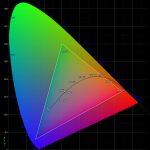Telegraphs 2: Post-attack vulnerability
Previous Article | Next Article My post on telegraphing enemy attacks, was about making an enemy telegraph before it attacks to ask the question: "Can you avoid my attack?" This…
Enemy Attacks and Telegraphing
Intro Like most things when it comes to video game design, I think of enemies in terms of: The Questions the enemy is asking players The Tools I need to…
Trinity
Intro This is one in a series of blog posts/articles I’m writing to describe my game design methodology. In the first article, I named the system “Trinity” – but I…
Ramps, Part 2
Intro This is one in a series of articles I’m writing to describe the way I approach game design. In this article, I’m going to show you a trick I…
Setups
Review This is one part in a series of articles that attempts to explain how I think when I design. The purpose of these articles is not as much to…
Spectra
Intro Chromaticity diagram for the CIE 1931 xy. Because spectrum. This is one part in a series of articles that will attempt to explain how I think when I design.…
Choice Fields
Intro A "Choice" Field. Get it? Eh? Eh? Why do I bother? This is a part of a series of articles that will attempt to explain how I think when…
A Game Design Methodology
Intro: This is the first of a series of blog posts which will try to convey my overall design methodology, which I’ve nicknamed Trinity for now. It’s a big task, and…
Quick Tip: Where do you start?
Game design is a circular problem, and figuring out where to begin can drive even the most seasoned professional a little batty. Where do you start? For example, let's say…




